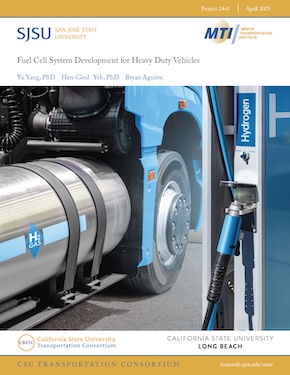- 408-924-7560
- mineta-institute@sjsu.edu
- Donate
Fuel Cell System Development for Heavy Duty Vehicles
As California advances its ambitious goals for transportation electrification to combat climate change, hydrogen-powered fuel cells are emerging as a viable solution for overcoming the challenges of heavy-duty vehicles, offering an efficient alternative to lithium-ion batteries because they produce minimal chemical, thermal, and carbon emissions. One type of hydrogen fuel cell technology called proton exchange membrane fuel cells (PEMFCs) has garnered the most attention due to its distinct advantages, including relatively low operating temperatures (60–80 °C) and reliable performance at high current densities. However, despite their promise, PEMFCs face challenges, including in optimizing stack power output and safety concerns. To tackle these issues, accurate modeling and control strategies are essential. This study focuses on using data-driven modeling (specifically using a process known as “closed-loop system identification” under proportional controller and pseudo-random binary sequence excitation methods) to better understand and manage PEMFC systems. Various transfer functions models were analyzed, including first-order, first-order plus time delay, second-order, and second-order plus time delay models. The resulting closed-loop identification approach was applied on the humidifier, cooling, and oxygen supplier subsystems of simulated PEMFC to build their models under controlled operations. The results of this study highlight the potential of closed-loop system identification techniques to improve fuel cell vehicle performance in power supply, water, and heat management, without interrupting PEMFC operations. These findings demonstrate the significance of precise modeling as a cornerstone for advancing PEMFC control strategies and optimizing their application in renewable transportation and a more sustainable future.
Yang, Yu, PhD
Dr. Yu Yang received his BSc degree from Beijing Institute of Technology, Beijing, China, in 2004; his MSc degree from Zhejiang University, Hangzhou, China, in 2007; and his PhD from the Department of Chemical Engineering, University of Alberta, Edmonton, Canada, in 2011. He then became a postdoctoral associate at the Massachusetts Institute of Technology. He currently is an Associate Professor in the Department of Chemical Engineering at California State University, Long Beach (CSULB). His research interests include data-driven modeling, advanced process control, machine learning, global optimization under uncertainty, and the analysis and design of renewable energy systems.
Yeh, Hen-Geul, PhD
Dr. Hen-Geul Yeh received his BSc degree in engineering science from National Chen Kung University, Taiwan, ROC, in 1978; and his MSc degree in mechanical engineering and his PhD in electrical engineering from the University of California, Irvine, in 1979 and 1982, respectively. Since 1983, he has been with the Electrical Engineering Department at CSULB and has served as the Department Chair from 2016 to 2022. In addition to his technical and engineering excellence, he was selected as a NASA JPL Summer Faculty Fellow twice, in 1992 and 2003, and the Boeing Welliver Faculty Fellow in 2006. His research interests include DSP/Communication/Control algorithms development using MATLAB, and their implementation using FPGA and digital signal processors with applications in communication systems, smart grids, optimization, controls, and electrical event detection, with a focus on real-time digital signal processing, Wi-Fi and Wi-MAX, adaptive systems, and mobile communication in multipath fading channels. He has published over 100 research papers on signal processing, communications, controls, and smart grids.
Bryan Aguirre
Bryan Aguirre holds a B.S. in Biochemistry from California State University, Los Angeles(CSULA) and earned an M.S. in Chemical Engineering from CSULB. His research interests are in the renewable energy and biotechnology sectors.
-
Contact Us
San José State University One Washington Square, San Jose, CA 95192 Phone: 408-924-7560 Email: mineta-institute@sjsu.edu






